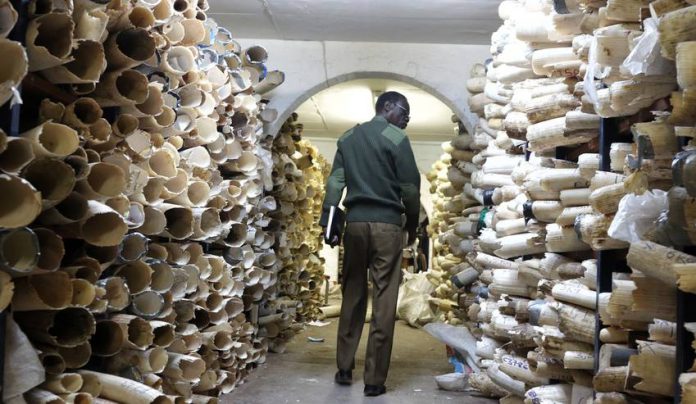Zimbabwe convenes summit to back bid to overturn ban on ivory sales
The Government hopes to build Southern Africa alliance to sell stockpiles of tusks

Your support helps us to tell the story
From reproductive rights to climate change to Big Tech, The Independent is on the ground when the story is developing. Whether it's investigating the financials of Elon Musk's pro-Trump PAC or producing our latest documentary, 'The A Word', which shines a light on the American women fighting for reproductive rights, we know how important it is to parse out the facts from the messaging.
At such a critical moment in US history, we need reporters on the ground. Your donation allows us to keep sending journalists to speak to both sides of the story.
The Independent is trusted by Americans across the entire political spectrum. And unlike many other quality news outlets, we choose not to lock Americans out of our reporting and analysis with paywalls. We believe quality journalism should be available to everyone, paid for by those who can afford it.
Your support makes all the difference.By Farayi Machamire for Zim Morning Post
Zimbabwe has invited several African states to converge in the country’s northwest mining town of Hwange later this month, with the view of forging alliances to push a fresh appeal for the sale of ivory, ahead of the 19th meeting of the Conference of the Parties to CITES (CoP19).
Previous proposals by Botswana, Zimbabwe and Namibia to resume international sales of ivory stockpiles have been rejected by member states of the Convention on the International Trade in Endangered Species , which regulates commercial trade in endangered species around the world.
At the 18th global wildlife summit in 2019, the proposal by Botswana, Namibia and Zimbabwe was rejected by 101 votes, with 23 in support and 18 abstentions.
Speaking after that failed bid, Matt Collis, Director of International Policy at the conservation organisation IFAW, said his organisation was delighted governments at CITES had chosen to reject “repeating a failed experiment.”
“Poaching skyrocketed across Africa after the last ivory stockpile sales back in 2008,” he said at the time.
Southern African states, which are home to about 200,000 elephants, half of the total number still roaming Earth, continue to argue that selling off their ivory stockpiles will fund conservation efforts.
Zimbabwe’s Deputy Environment Minister, Barbara Rwodzi, said the Hwange ivory conference, planned for May 23 to 25, will set the foundation for a renewed ivory sale bid at the next CITES conference, due in Panama City in November.
“We are saying: let’s come together before Cop19….We are going to host an elephant conference with other countries who have elephants because we want to have one voice,” Rwodzi said.
“We only have the capacity to hold 40,000 elephants but because we have an excellent conservation programme, the herd has grown to 90,000 and it’s causing problems,” she added.
Zimbabwe’s Government believes lifting restrictions in the sale of the country’s stockpile will fund conservation for the next 20 years.
That way, they say, the country will not need to carry a begging bowl to finance conservation of its wildlife heritage.
“As a country, we have not fully benefited from such a huge (elephant) population due to various restrictions including international ivory trade,” Zimbabwe’s Minister of Environment, Climate Change, Tourism and Hospitality Industry, Mangaliso Ndlovu, said in February 2022.
“We will therefore continue to work with like-minded nations to push for decisions that promote the growth and stability of our wildlife populations. We also call for CITES Parties to make science based decisions rather than populist decisions whose long term effects threaten the same species we seek to protect,” he added.
Activists say Zimbabwe’s bid will fall flat on its face, alleging existing conservation mechanisms have shown that they are susceptible to corruption and capture, adding that lifting of restrictions will drive elephant populations to extinction.
“They are trying to influence southern African neighbours and parts of Africa, but most of the world does not want it to happen,” animal rights activist Sharon Hole told Zim Morning Post.
“Not so long ago, ZimParks told the Parliament of Zimbabwe that it sold an individual elephant at US$32,000 (£26,000) yet one elephant sale price can reach US$100,000 (£82,000). This tip of the iceberg shows the system cannot be trusted,” she added. ZimParks argue, there are signed agreements for such transactions and everything is audited.
This year, the 19th meeting of CITES (CoP19) will be held from 14 to 25 November 2022 in Panama.
Governments around the world will gather to review and make decisions on the regulation of trade in endangered species.
This article is reproduced here as part of the African Conservation Journalism Programme, funded in Angola, Botswana, Mozambique, and Zimbabwe by USAID’s VukaNow: Activity. Implemented by the international conservation organisation Space for Giants, it aims to expand the reach of conservation and environmental journalism in Africa, and bring more African voices into the international conservation debate. Read the original story here:
Join our commenting forum
Join thought-provoking conversations, follow other Independent readers and see their replies
Comments